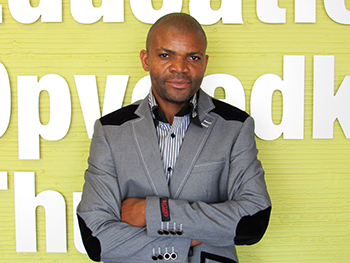Latest News Archive
Please select Category, Year, and then Month to display items
06 April 2018
Photo Rulanzen Martin
 From the left: Dr Thulisile Mphambukeli, leader of the BRICS research team that is exploring the political economy of water and food security, and her research partner, Dr Victor Okorie.
From the left: Dr Thulisile Mphambukeli, leader of the BRICS research team that is exploring the political economy of water and food security, and her research partner, Dr Victor Okorie.
A Brazil, Russia, India, China and South Africa (BRICS) delegation is to hold the 10th Annual BRICS Summit in the last week of May 2018 in Johannesburg. Dr Thulisile Mphambukeli, leader of the University of the Free State (UFS) research team alongside Dr Victor Okorie from the Department of Urban and Regional Planning, in collaboration with Prof Lere Amusan of North-West University, will ensure that water and food security is a prominent feature on the gathering’s agenda.
First, the project titled: “Exploring the political economy of water and food security nexus in BRICS and Africa” will debut at the National Institute for the Humanities and Social Sciences BRICS Think Tank Forum”.
According to Dr Mphambukeli, the key to water security is attitudinal change by means of education and conscientisation. This, she is adamant about, holds the potential to drive behavioural adjustments in the way society interacts with water.
Genetic and social approaches
Dr Okorie asserts that if strides towards reducing the demand for water were to be made, research efforts should be geared towards effecting changes at DNA level. Meaning we need to explore waterwise ways that enable crops and animals to thrive optimally.
The project also looks at social dimensions of water such as flushing a toilet. “Research activities on redesigning toilets, especially the urinal, where more than nine litres of water are used to flush less than one cubic centimetre of urine, are timely in the context of managing water and the food nexus crises,” said Dr Okorie.
Combining the genetic and social approaches would allow us to produce more with a smaller water footprint. This can be made possible by implementing precision agriculture which is about estimating and applying exact quantities of water and nutrients needed for the production of crops or the raising of livestock.
Paradigm shifting policies
Prof Amusan said the team intended to propose functional solutions that take the quality of water into consideration. Equitable production and distribution of water depends on endorsing policies of co-production between citizens, governments and the public sector. BRICS member states mutually consider water and food security as an issue of paramount significance, hence its feature on this prestigious summit’s agenda.
UFS PhD scholar honoured by Free State MEC of Education
2016-12-12

Thabo Sithole was awarded a National Teaching Award
for excellence in teaching Physical Sciences.
Photo: Aneka van der Merwe
Thabo Sithole, a PhD student at the University of the Free State’s (UFS) Faculty of Education, was recently awarded a prestigious award during the provincial National Teaching Awards in November at which he was celebrated along with other teachers from the Free State.
Sithole was awarded for excellence in teaching Physical Sciences, using a variety of strategies to appeal to the different abilities of learners.
He holds a BSc Medical Microbiology, BSc Chemistry, BCom Economics, BSc Hons in Chemistry, BCom Hons in Economics and MA in Mathematics. To qualify to become an educator, he completed his Postgraduate Certificate in Education (PGCE) at UFS.
Apart from teaching, Sithole assists youths confronted with substance abuse and was instrumental in getting funding to assist young people in Jacobsdal. The Albertina Sisulu Youth Recreation Centre in the town now receives annual funding from the Free State Department of Social Development.
Through the National Teaching Awards, the Department of Basic Education acknowledges the extraordinary efforts of teachers, often achieved under very difficult conditions and in service to children from underprivileged families and economically depressed communities.
Leadership is a crucial element to all schools functioning at optimum with all teachers, learners and parents moving forward with a common vision for the improvement of the school.
Sithole’s work also focuses on clustering childhood development centres to work together in order to enhance the preparedness of learners entering primary school. The MEC for Education, Mr Tate Makgoe, said the National Teaching Awards recognised and promoted excellence in teaching.
The UFS Faculty of Education congratulated all teachers in South Africa who worked tirelessly to build a better future for all learners.